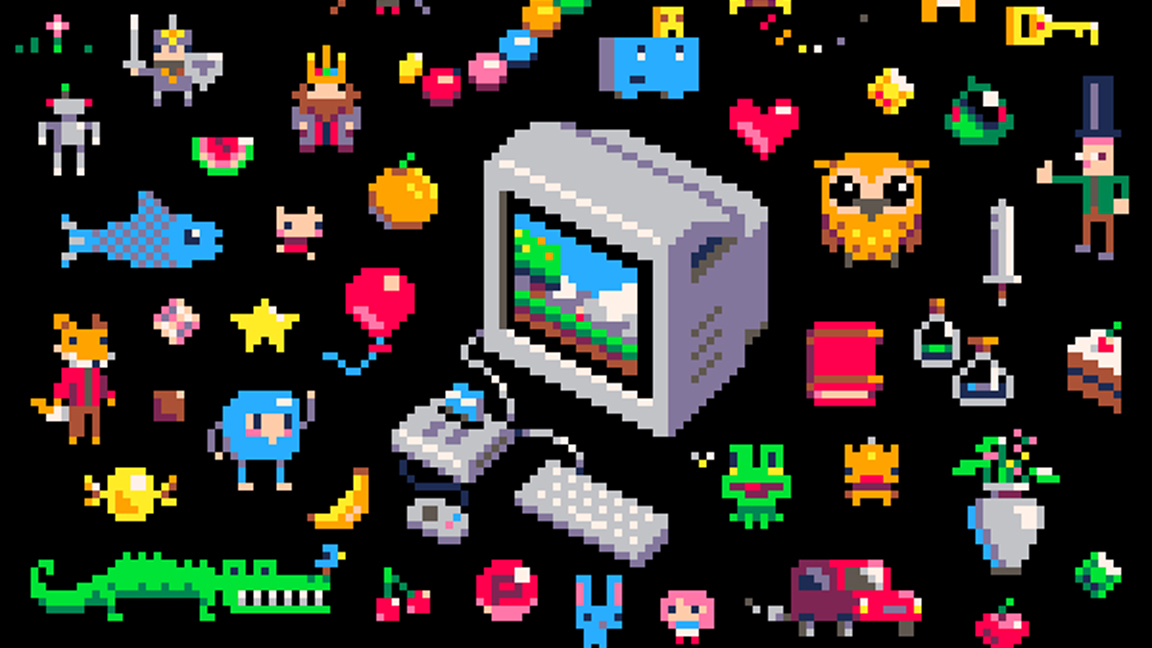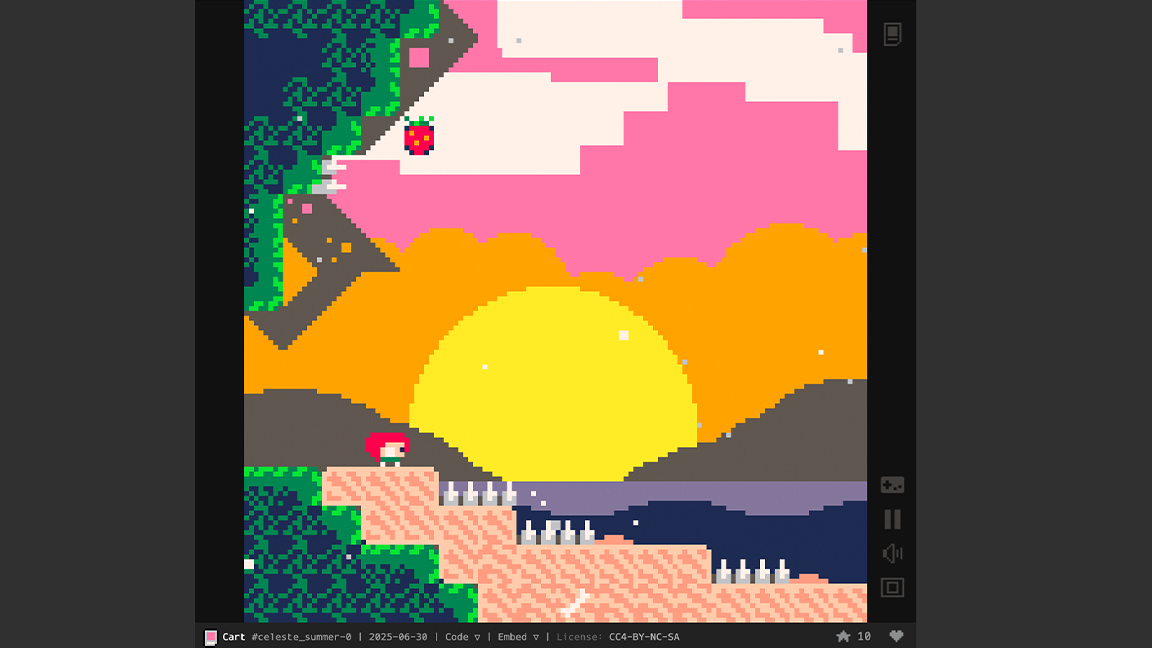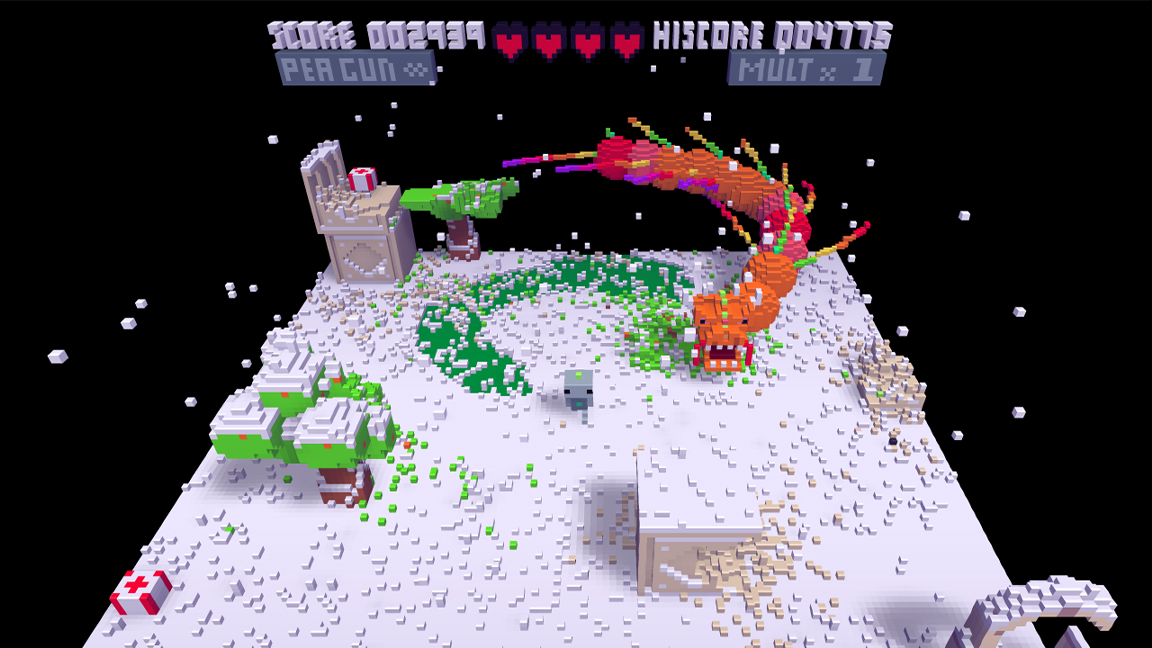I discovered a secret 'fantasy console' packed with the best games you've never heard of – and it lets you make your own

Sign up to Creative Bloq's daily newsletter, which brings you the latest news and inspiration from the worlds of art, design and technology.
You are now subscribed
Your newsletter sign-up was successful
Want to add more newsletters?
If I told you that one of the most influential indie games of the past decade started life in a make-believe console with a 128 x 128 resolution and a 16-colour palette, you might raise an eyebrow. But that’s exactly what happened with Celeste, a twitchy little, brutally difficult platformer born inside a 'fantasy console' called PICO-8 but found fame on the best game consoles, like PS4 and Nintendo Switch.
Since then, the minimalist dev tool PICO-8 has become a hidden haven for some of the most inventive, charming, and unexpectedly powerful games you’ve probably never played. I discovered it by accident when searching for new retro games, and I'm glad I did. It's the kind of platform that makes me rethink what retro games are – nothing here is 'old' – but each one embodies the spirit of the age of Atari, ZX Spectrum, and NES. (For actual golden oldies, read my guide to the best retro game consoles.)
PICO-8 isn’t real, as such. Let me clarify: PICO-8 is not real in the hardware sense. It’s a 'fantasy console,' designed by Lexaloffle to mimic the constraints of 1980s-era gaming: 8-bit audio, two-button input, a fixed 128 × 128 pixel display, and just 32KB of cartridge space. You'd imagine making games in this format would be impossible given today's love of Naninte, ray-tracing, and heaving open worlds. And yet, somehow, creators, artists, and hobbyist developers shrug off expectation and just experiment; they make simple, addictive little games. The kind of games I grew up on. Which is why I love it.

LImitations force creativity
What makes PICO-8 games so compelling isn’t just their retro aesthetic; it’s how these limitations force creativity to the forefront. While AAA game budgets and scope balloon into 200-hour marathons packed with feature creep and loot systems, PICO-8 feels like a breath of crisp, 8-bit air. These games are short, sharp, and satisfyingly self-contained. They know exactly what they want to be, and they deliver.
Take Dodger, a tiny masterpiece of design minimalism. It’s a single-screen arcade game that boils down 1984's Bomb Jack into a twitchy pixel block-collecting speed run – pick up the pills and dodge the amassing red dots. It manages to deliver the adrenaline of a full game.
Then there’s POOM, a pixel-perfect homage to DOOM, recreated inside PICO-8’s impossibly small world. Because, y'know, every system needs a Doom. This game is not just a clever demake; it’s a technical marvel that shows how far clever programming and creative compromise can take you if you dare to think differently.
As POOM reveals, there's a fun underbelly of homages on PICO-8, where devs recreate favorite games of old just to see if it can be done. My current addiction of choice is Pico Hunt, and yes, it is a PICO-made version of NES classic Duck Hunt, right down to a nicely animated, and still nameless, dog who laughs at me when I miss a shot.
Sign up to Creative Bloq's daily newsletter, which brings you the latest news and inspiration from the worlds of art, design and technology.
What’s most surprising about the PICO-8 scene is its diversity. Yes, there are platformers and puzzle games, but also story-driven adventures, turn-based tactics adventures, even rhythm games, and physics-based puzzlers. And because the community is small and welcoming, you’ll find devs sharing their source code, offering feedback, and remixing each other’s work in the spirit of open creativity.

A designer's game dev tool
PICO-8 is also the perfect playground for artists and designers who want to test ideas without being overwhelmed by more complex tools. The built-in sprite editor, sound tracker, and code window are all unified in a single environment. There's no barrier between idea and execution. It's the kind of toolset that means even the most naive game-maker – and that's me, by the way – can doodle, fiddle, and end a weekend with something to show for it. Will it be the next Celeste? No, but it'll be your little slice of game development.
But perhaps the most magical thing about PICO-8 is how it reframes what we think a 'good game' looks like. In the face of GTA 6 predicted to make billions in its first two months on sale, game budgets veering out of control, PICO-8 is a reminder that size doesn’t matter, that polish isn't everything, and that some of the most memorable experiences can be delivered in ten minutes or less.

In an era of bloated backlogs and 200GB downloads, there’s something profoundly refreshing about loading up SPLORE (PICO-8’s built-in browser) and discovering a game that makes me smile, think, or frustrate, all within the span of my coffee break.
That's not to say PICO developer Lexaloffle has been cracking its knuckles and ushering in some new tech of its own. Voxatron, for example, is a new fantasy console, with carts made from voxels, think of these as 3D pixels. It means PICO-8 devs now have a third dimension to play in, and I can't wait to see what's made, though I'd imagine a whole bunch of Pilot Wings variants are incoming.
So if you’re a designer, artist, or just a curious gamer, do yourself a favour: explore the micro world of PICO-8. You won’t find photo-realism or massive open worlds. You won't wander in ray-traced vistas or be asked to tick DLSS boxes. But you will find some of the best games you’ve never played, and maybe even feel inspired to make one yourself.
Visit the PICO-8 website to play games and start creating; it costs $14.99. There is a free educational browser version, too.

Ian Dean is Editor, Digital Arts & 3D at Creative Bloq, and the former editor of many leading magazines. These titles included ImagineFX, 3D World and video game titles Play and Official PlayStation Magazine. Ian launched Xbox magazine X360 and edited PlayStation World. For Creative Bloq, Ian combines his experiences to bring the latest news on digital art, VFX and video games and tech, and in his spare time he doodles in Procreate, ArtRage, and Rebelle while finding time to play Xbox and PS5.
You must confirm your public display name before commenting
Please logout and then login again, you will then be prompted to enter your display name.
